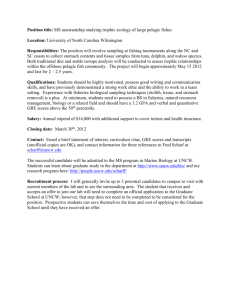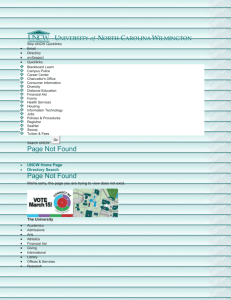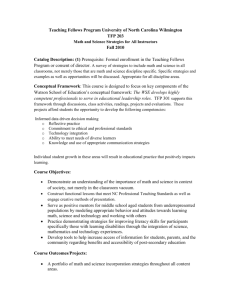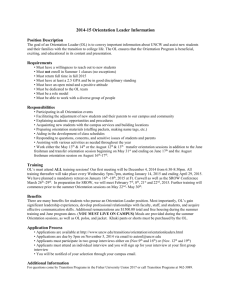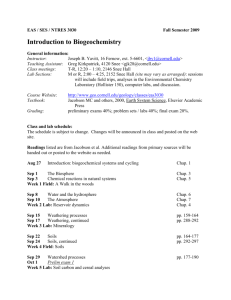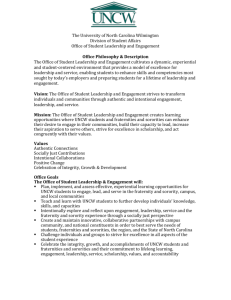Fisheries Biology Syllabus - BIO 458, Fall 2014
advertisement
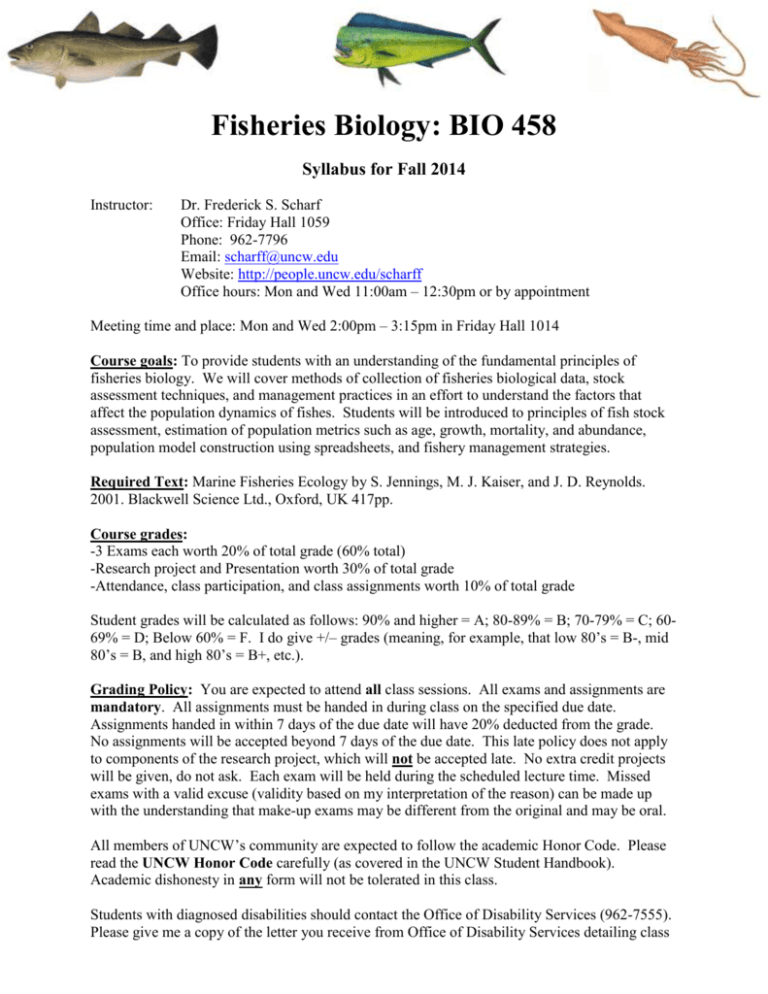
Fisheries Biology: BIO 458 Syllabus for Fall 2014 Instructor: Dr. Frederick S. Scharf Office: Friday Hall 1059 Phone: 962-7796 Email: scharff@uncw.edu Website: http://people.uncw.edu/scharff Office hours: Mon and Wed 11:00am – 12:30pm or by appointment Meeting time and place: Mon and Wed 2:00pm – 3:15pm in Friday Hall 1014 Course goals: To provide students with an understanding of the fundamental principles of fisheries biology. We will cover methods of collection of fisheries biological data, stock assessment techniques, and management practices in an effort to understand the factors that affect the population dynamics of fishes. Students will be introduced to principles of fish stock assessment, estimation of population metrics such as age, growth, mortality, and abundance, population model construction using spreadsheets, and fishery management strategies. Required Text: Marine Fisheries Ecology by S. Jennings, M. J. Kaiser, and J. D. Reynolds. 2001. Blackwell Science Ltd., Oxford, UK 417pp. Course grades: -3 Exams each worth 20% of total grade (60% total) -Research project and Presentation worth 30% of total grade -Attendance, class participation, and class assignments worth 10% of total grade Student grades will be calculated as follows: 90% and higher = A; 80-89% = B; 70-79% = C; 6069% = D; Below 60% = F. I do give +/– grades (meaning, for example, that low 80’s = B-, mid 80’s = B, and high 80’s = B+, etc.). Grading Policy: You are expected to attend all class sessions. All exams and assignments are mandatory. All assignments must be handed in during class on the specified due date. Assignments handed in within 7 days of the due date will have 20% deducted from the grade. No assignments will be accepted beyond 7 days of the due date. This late policy does not apply to components of the research project, which will not be accepted late. No extra credit projects will be given, do not ask. Each exam will be held during the scheduled lecture time. Missed exams with a valid excuse (validity based on my interpretation of the reason) can be made up with the understanding that make-up exams may be different from the original and may be oral. All members of UNCW’s community are expected to follow the academic Honor Code. Please read the UNCW Honor Code carefully (as covered in the UNCW Student Handbook). Academic dishonesty in any form will not be tolerated in this class. Students with diagnosed disabilities should contact the Office of Disability Services (962-7555). Please give me a copy of the letter you receive from Office of Disability Services detailing class accommodations you may need. If you require accommodation for test-taking please make sure I have the referral letter no less than three days before the test. UNCW practices a zero tolerance policy for violent or harassing behavior. For an emergency of this type contact the police at 911 or UNCW CARE at 962-2273. Resources for individuals concerned with a violent or harassing situation can be located at http://uncw/wrc/crisis.html. Learning objectives: By the end of this course, students should be able to: 1. Communicate an understanding of the fundamental principles of fisheries biology, including how fish populations are assessed. 2. Identify the key pieces of information needed to determine the status of a fish population. 3. Identify various fishery management strategies and the reasons for fishery management successes and failures. 4. Demonstrate the ability to comprehend, summarize, and critique peer-reviewed literature. 5. Demonstrate the ability to research an outlined topic; then communicate the results of that research, both in writing and orally, to their peers. THE UNIVERSITY LEARNING CENTER DePaolo Hall 1056 & 1003, first floor (910) 962-7857 www.uncw.edu/ulc The University Learning Center’s (ULC) mission is to help students become successful, independent learners. Tutoring at the ULC is NOT remediation: the ULC offers a different type of learning opportunity for those students who want to increase the quality of their education. ULC services are free to all UNCW students and include the following: --Learning Services (University Studies) http://www.uncw.edu/ulc/learning/index.html --Math Services http://www.uncw.edu/ulc/math/index.html --Supplemental Instruction http://www.uncw.edu/ulc/si/index.html --Writing Services http://www.uncw.edu/ulc/writing/index.html Important dates to remember Aug 27 – Add/drop period ends Sep 1 – NO CLASS – Labor Day Sep 24 – 1st written section of research project due today at start of class (not accepted late) Oct 8 – last day for W Oct 29– 2nd written section of research project due today at start of class (not accepted late) Nov 26 – NO CLASS - Thanksgiving Dec 3 – final written section of research project due at the start of class (not accepted late) 2014 Class Schedule Date Lecture topic Reading Aug 20 Introduction to fisheries science Chap. 1 Aug 25-27 Production and fishery resources Chap. 2-3 Sep 3 Fishing gears and methods Chap. 5 Sep 8-10 Population dynamics (growth) Chap. 4 Sep 15-17 Population dynamics Chap. 4 Sep 22-24 Mortality; Exam 1 this week (likely on the 22nd) (res. project sect. I due Sep 24) Chap. 4 Sep 29 – Oct 1 Density dependence Chap. 4 Oct 6-8 Abundance estimation Chap. 9-10 Oct 15 Reproduction Chap. 9 Oct 20-22 Life history; Exam 2 this week (likely on the 22nd) Chap. 3 Oct 27-29 Stock – recruit models (res. project sect. II due Oct 29) Chap. 4 Nov 3-5 Surplus production models Chap. 7 Nov 10-12 Dynamic pool and cohort models Chap. 7 Nov 17-19 Fisheries management and effects of fishing Chap. 17 Nov 24 Exam 3 today Dec 1-3 Student presentations (final and full draft of research project due Dec 3) Dec 10 (*3-6 pm*) Student presentations
